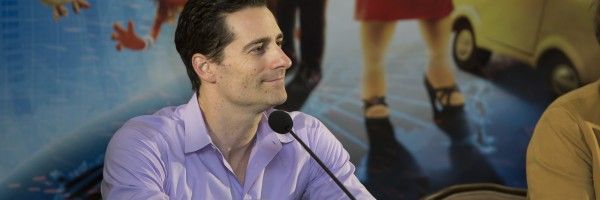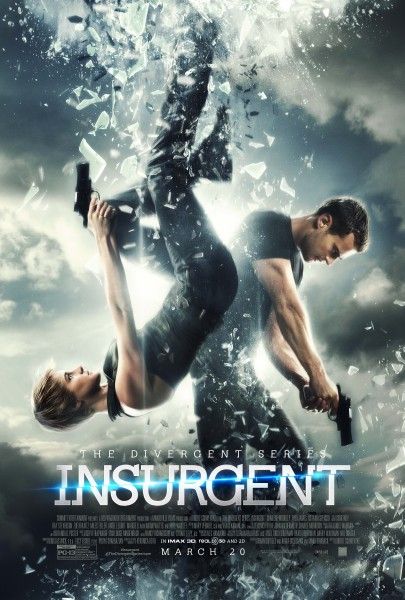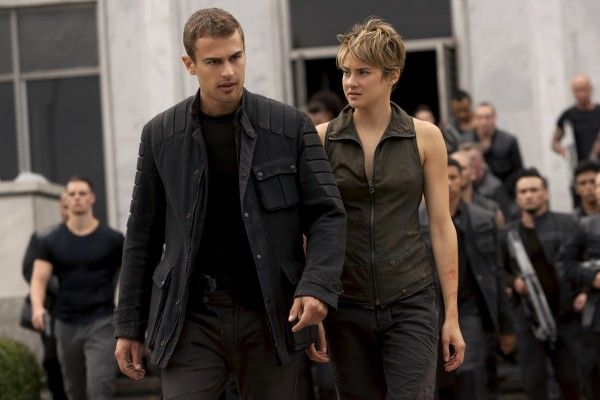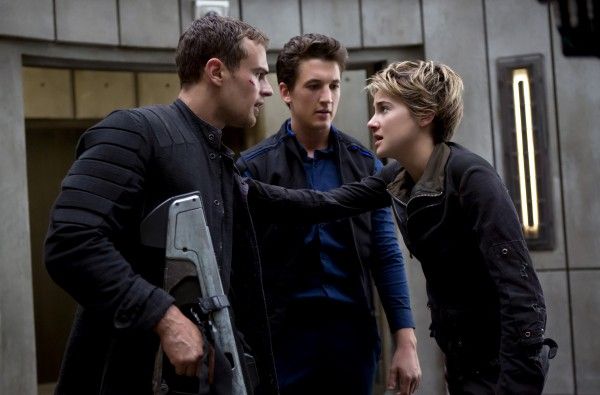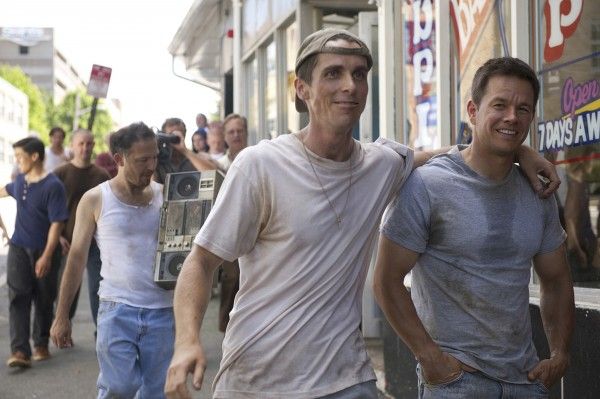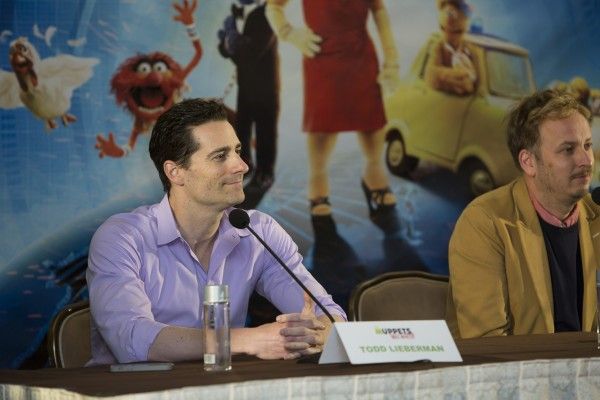In The Divergent Series: Insurgent, Tris (Shailene Woodley) and Four (Theo James) are on the run from the treacherous Jeanine (Kate Winslet), the power-hungry leader of the Erudite faction who will stop at nothing to put an end to the Divergent. While trying to unite Amity, Candor, Abnegation, Dauntless and the Factionless, Tris tries to uncover a secret that will explain why Jeanine will stop at nothing to capture her.
At the film’s press day, executive producer Todd Lieberman (with Mandeville Films) spoke to Collider for this exclusive interview about why he got involved with The Divergent Series after the first film had been made, what they were excited about building on from the first film, what they had to problem-solve, what he’s looking forward to with The Divergent Series: Allegiant, and tackling the final book’s controversial ending. He also talked about their upcoming live-action adaptation of Beauty and the Beast, the adaptation of the best-selling book Wonder, about a young boy with a facial deformity who goes to school after being home-schooled for 10 years, where we could see more of The Muppets, what’s going on with The Fighter sequel, and the TV shows they have in development.
Collider: Movies that are young adult adaptation can be really hit-and-miss. Some of them do really well, but some of them don’t. So, what was it about this particular one that attracted you, and what do you think it is that is attracted that bigger audience?
TODD LIEBERMAN: That’s a great question. I read the books and the thing that I responded to was that question of, what does it mean to be human? What makes up a human being? What was really exciting to me about this particular movie and the thing that I think we came to in the course of development was, if we were able to collate all those ideas and put it on one singular spine, so that at the end of the movie, when Tris realizes that, in order to become the whole person and accept every part of herself, is what enables the next phase of the process to go. That felt like a really powerful message to me, not only for young girls and women, but for everybody. So, for me, that’s what really attracted me to it. Being able to say, “I love myself,” is a great message.
At a time when we have such a low number of female-led films, what do you think it is that makes a great bad-ass female lead, specifically with this character and with Shailene Woodley?
LIEBERMAN: Well, we start by being lucky to have someone like Shailene, who’s an awesome actress and an awesome person. The person she is really translates to the screen, very well. She’s accessible. She’s real. She’s very relatable. It’s great to see a relatable, accessible young woman out there, doing things and breaking the barriers for what would be considered an action movie. I remember showing the movie to my wife and she was like, “This is just a phenomenal film for women. It’s a wonderful kick-ass lead action role for a woman.” You don’t see those a lot. That’s not to take away anything from anything else is doing. Everyone plays a very important role. The romance is a big deal. The familial relationships are a big deal. There’s great interplay with the bad guys and good guys. But at the center of it is this young woman who’s trying to find herself, and in the course of that, she’s doing all of these amazing, outstanding physical things. And Shai comes at her acting from a very authentic place. It’s important to her, for every scene, every piece of dialogue, every word and every thing she’s doing, to be as authentic and real as possible, and that clearly translates. In a weird way, she’s not acting. She’s becoming.
Are there challenges specific to coming on, as a producer, for a second film, when you weren’t a producer on the first?
LIEBERMAN: Yeah, there was certainly a learning curve. There were all these people who knew the world and what was going on, and I didn’t. But, it was fine. It was great. I came on, we hired Robert Schwentke, and everybody, including Robert and I, who hadn’t worked on the movie, had read all of the books, knew the material very well, and thankfully were all speaking the same language. So, there was a little bit of a learning curve and a little bit of a new kid of the block scenario, for the both of us, but that went away very quickly and we became a great creative unit.
Because the book series was finished, by the time you were making this second film, did that affect the approach, at all, since you knew where you had to end up?
LIEBERMAN: A little bit, yeah. We wanted to make sure that we didn’t dynamically change anything that was fundamental to the story. We weren’t going to do anything with Insurgent that went against the rules in Allegiant, so we had the benefit of knowing where it went. But for the most part, we focused on this particular story while knowing that, in the future, we couldn’t up-end this relationship or fully arc that relationship, and we couldn’t make this person a good guy who becomes a bad guy. We stuck to the fundamental truths, but for the most part, we had a great blueprint with the book.
What do you feel the first film really got right, that you were excited about getting to build on with this one?
LIEBERMAN: It’s always hard for the first movie because you have to spend so much time introducing the characters. And this is a world, so people have to get to know these characters. Those who have read the book obviously know Tris, Four, Caleb and all of these characters, but they’ve never met them in person. You have to get used to Shailene Woodley playing Tris, and you have to get used to Theo James playing Four. And of course, marketing and publicity does an amazing job of prepping everybody for that, but there’s nothing like sitting there and experiencing the movie. So, they had to tell a story, but also make sure that everyone fell in love with these characters. Now, I came in to the benefit of that already having been done, thankfully, so we got to play a little bit more. The goal, from the beginning, with this was to take the characters that have been set up so well, and keep everything as grounded and emotionally real as possible, but blow it out. We had to take advantage of the SIM world, which is an advantage of the story that we had. It was an asset to the story that we could take real visual advantage of, and it was really fun doing it. We didn’t have a lot of time, but it was fun.
Was there anything, as a producer, that you had to problem-solve, but are proud of the ultimate outcome?
LIEBERMAN: That’s a great question. The real answer is that I don’t feel we had to compromise much. The studio was amazing, in terms of really seeing the great potential for it and giving us the resources to do it. If there’s an example that I could think of, that would be what I like to call “creative solutions to expensive problems,” there’s a scene in the movie where Four and Tris go into a truth-telling apparatus. In the book, it’s this giant auditorium filled with thousands and thousands of people in a trial scenario. We felt, creatively, that we didn’t necessarily want to do a big amphitheater. We couldn’t find a big amphitheater, and it was going to cost a whole lot of money to replicate or be able to build something like that. So, that became a creative solution where Robert and the production designer created this truth-telling apparatus that simulated lots of people around, but concentrated more on the characters than it did the crowds, and cost a fraction of the price. When you look at it, it’s cool and different. You haven’t seen something like that before. I think it actually turned out for the positive. Sometimes when you have limited resources, not that we did on this, and you really have to think about creative ways to get around some of these problems, generally the end result is better.
You’re in the unique position with Insurgent, in that you’re building on the world from Divergent, but you’re also setting up the world of Allegiant. What are you most excited about getting to share, outside of the fence? Are you looking forward to getting to explore an even bigger world?
LIEBERMAN: Yeah. I don’t want to promise too much, but I can say that the things that we’ve talked about have been very, very cool. There’s going to be some really mind-blowing visuals. Those who have read the book know where it goes. It goes into a whole different world, and we’re really excited to explore that.
There were some fans who were really angry with the ending for the book series. Do you worry about that or take that into consideration, at all, or is your main goal to be true to the story that was told?
LIEBERMAN: It’s a hard question to answer. We’re taking Allegiant and splitting it into two, so the first part of it won’t go that far. But yeah, the book had that ending, and there was certainly controversy over it. Personally, I feel that it’s an important arc for that character. But we haven’t actually discussed too much of that yet.
And the ending of any popular franchise can never possibly please everybody.
LIEBERMAN: Yeah, they’re beloved characters. I can see how that would cause a controversy. Sometimes you have to make bold choices, creatively. I’m always in favor of that.
What’s up next on your slate? Do you know what’s going into production next?
LIEBERMAN: Actually, we’re starting to shoot Beauty and the Beast for Disney and Allegiant on the same day, May 18th. Beauty and the Beast we’re wildly excited about. That’s shooting in London. We’ve got Emma Watson, we’ve got Bill Condon directing, and Stephen Chbosky wrote our script. It’s really fun, and we couldn’t be happier about that. And we have Allegiant. And then, I don’t know exactly when it will shoot, but we’re getting ready to hopefully shortly prep a book called Wonder, which is about a young boy with a facial deformity. It’s about his first year going into school, after being home-schooled for 10 years. It’s a beautiful work that’s become required reading in schools. It’s just taken off. It’s been #1 on the best-seller list for 120 weeks straight. When you look at just those three things – Beauty and the Beast, Allegiant and Wonder – they couldn’t be more different, and yet all of them have a center of why they tell the story.
Was it the script that attracted the cast for Beauty and the Beast, or was it Bill Condon as the director?
LIEBERMAN: I think it’s a little bit of everything. It’s a beloved title. People grew up on the animated movie. Bill Condon is Bill Condon. And nobody does those movies better than Disney does.
There have been a lot of fairy tale retellings recently that have chosen to go darker, but Cinderella went the very classic route. Where will Beauty and the Beast fit in?
LIEBERMAN: I think it will stick a little bit more to the classic, but there will be new elements and new characters.
Do you know when or if there will be more of The Muppets, either on the movie side or on the TV side?
LIEBERMAN: The answer is that I don’t know, actually. I love The Muppets, tremendously. I can also say that I’m happy to be doing other things, at the moment, as much as I love them. I imagine that there will be more Muppets things in the future, but I don’t know when. When we were first invited in to do The Muppets, and we were developing the script, we did this table read with all the actors and we brought out The Muppets. That was the first time I’d met them, and it was crazy. It was wild.
Is it finally time to say that the sequel to The Fighter just isn’t going to happen?
LIEBERMAN: Boy, that thing! I’ll say never say die. There’s definitely interest in it. It’s another one I don’t know the answer to. I can tell you that there’s interest. If it will happen or not, I don’t know. If it does, I’m thrilled. It’s a world I love and characters I love, too. It was an amazingly fun time.
How did By Way of Helena turn out, and how do you feel about the work the cast did in that?
LIEBERMAN: My partner, David Hoberman, manned that one. I’ve seen it. It’s good. It has Liam Hemsworth and Woody Harrelson. For us, just as film lovers, when you think of classic movie genres, and certainly ones that don’t get made a lot today, the Western would fall into that category. So, we felt incredibly lucky to be able to make a Western. That was always a goal, growing up watching all these Westerns. We said, “Boy, how do you make one of those today?,” and we got to, so that was fun.
How do you decide which TV shows you want to get behind?
LIEBERMAN: For television, we really focus in on writers we love and we just go after writers we love. This year, we were lucky enough to partner up with Jenna Bans and Steven Baigelman on two different shows. We just love them. They’re incredibly talent, great people who are wildly imaginative, and they came up with two really class A ideas. One (L.A. Crime) is about a serial killer on the Sunset Strip in the early ‘80s. It’s super cool to play with the music world and that Los Angeles life back then, which I’m a little too young to have known, but have done the research on. It was a wild time. And then, the other one (Flesh and Blood) is this amazing mystery drama about a family where a young boy goes missing, and 10 years later, he shows up and you’re not sure if it’s actually him or an imposter. So, there are tentacles on both those shows that go off in thousands of directions that the story could go. They’re rich with character, and are worlds that we’re very interested in. But most importantly for television – and it’s important for films too – you want to partner up with the best possible writer, and we’ve got two great ones.
The concept for L.A. Crime sounds really interesting, with it exploring sex, politics and popular culture across various eras in Los Angeles history, each season. Do you feel like broadcast TV is really ready to embrace the cable model that they seem to be trying to emulate?
LIEBERMAN: The goal for that one is that, in the midst of all the crime that’s going on, in the different time periods of the show, it’s really a love letter to Los Angeles. People are sophisticated viewers, as evidenced by the risks that are taken in cable television, and I think network has to do the same thing. I won’t even speak for network. I’ll just speak for us. We, as producers, want to do the same thing. We want to tell the best stories. We want to tell the stories that people will talk about. We want to tell the stories that have resonance, meaning and discussion afterwards. I like to do it with films, where it’s entertainment plus something, whether it’s a discussion afterwards or compelling you to go do something charitable. Television is the same. You want to tell a great story. You want these characters to become part of people’s lives. And then, hopefully, that generates discussion.
The Divergent Series: Insurgent is now playing in theaters.


